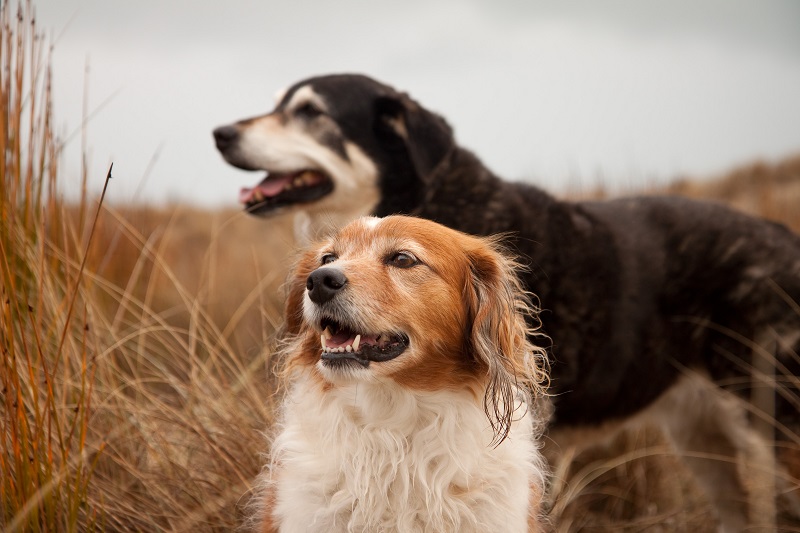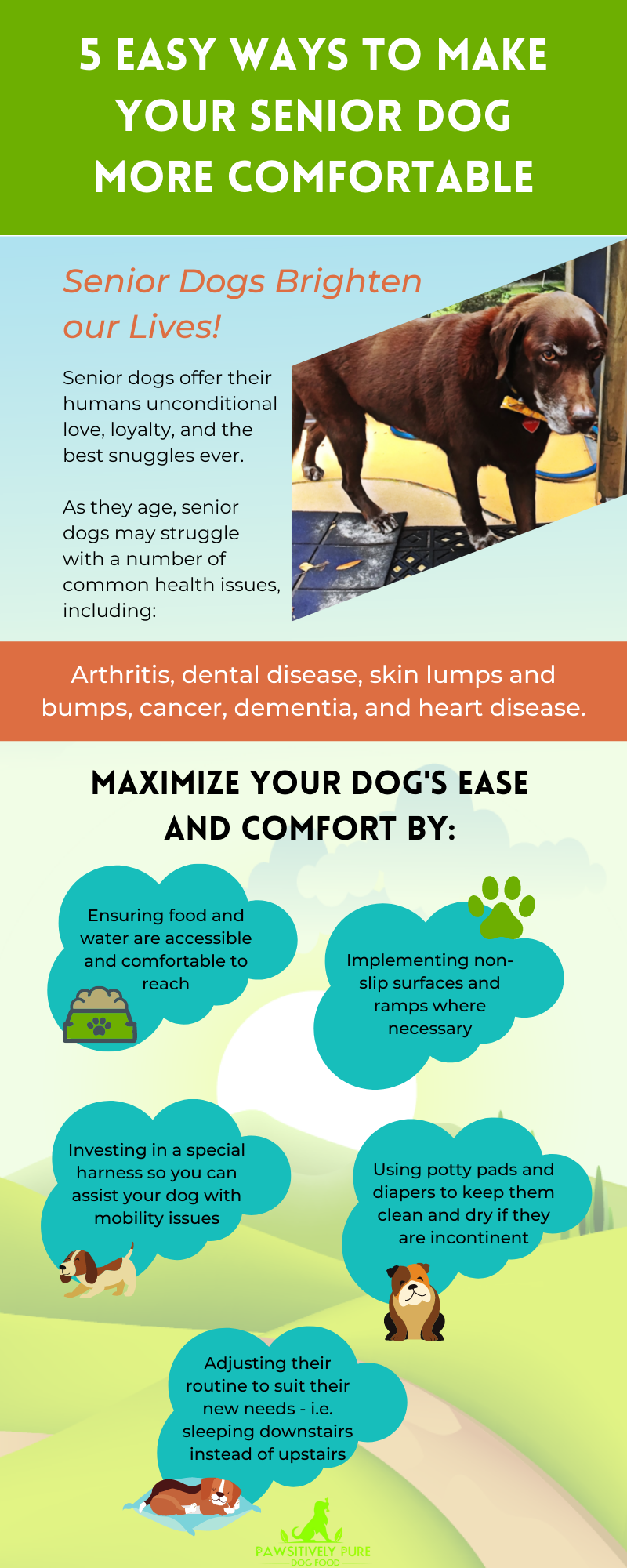As an Amazon Associate I earn from qualifying purchases.
Caring for older dogs requires special attention and love. Their needs change as they age.
As our furry friends grow older, they may need extra care to stay happy and healthy. Older dogs can face various health issues, such as arthritis, dental problems, and vision loss. Their energy levels may drop, and they might need more frequent vet check-ups.
Understanding these changes is vital for their well-being. By learning a few essential pet care tips, you can make your senior dog’s life more comfortable. This guide offers practical advice on how to support your aging canine companion. Let’s ensure they enjoy their golden years to the fullest. Read on to discover key tips for caring for your senior dog.

Credit: www.morrisanimalinn.com
Recognizing Aging Signs
Older dogs may walk slower. They might have trouble climbing stairs. Their fur can turn gray. Eyes may get cloudy. Hearing may decline. Joint pain is common. Weight gain or loss can occur. They may sleep more.
Older dogs may become less active. They might prefer resting. They can become more attached to you. Anxiety can increase. Some may forget house training. They might get confused easily. Their patience can decrease. They may bark more often.
Nutrition Needs
Older dogs need fewer calories. They may gain weight easily. Low-fat food helps keep them healthy. High-fiber food can aid digestion. Protein-rich diets help maintain muscle. Always choose quality dog food. Treats should be low-calorie. Avoid table scraps. Consult your vet for the best diet plan.
Older dogs need more water. Dehydration can cause health problems. Fresh water should always be available. Some dogs may drink less. Adding water to their food can help. Wet dog food contains more water. Monitor their drinking habits. Encourage them to drink often. Proper hydration keeps them healthy.
Exercise And Mobility
Older dogs need regular exercise to maintain mobility and overall health. Short, gentle walks can help keep their joints flexible. Always monitor their activity to avoid overexertion.
Gentle Exercises
Older dogs need exercise to stay healthy. Gentle walks are best. Keep the walks short. Avoid steep hills. Use soft ground to protect their joints. Swimming is also good. It is easy on their body. Playing in water can be fun. Always supervise your dog during these activities.
Joint Health
Joint health is very important for older dogs. Glucosamine can help their joints. Ask your vet about supplements. Soft bedding can ease joint pain. Keep their weight in check. Extra weight adds stress to joints. Massage can also help. It improves blood flow and reduces pain.
Mental Stimulation
Older dogs need mental stimulation. Interactive toys can help. These toys can keep their minds sharp. They can also reduce boredom. Choose toys that are safe and fun. Puzzle toys are a good choice. They offer a challenge. Look for toys that dispense treats. Your dog will enjoy the reward.
Training games can be fun. They also keep your dog’s mind active. Simple commands work best. Sit, stay, and come are good examples. Use treats as rewards. This makes learning fun. You can also try new tricks. Keep the sessions short. Older dogs can tire easily. Always end on a positive note.
Regular Vet Visits
Regular vet visits are crucial for older dogs. They help catch health issues early and keep your pet comfortable. Regular check-ups ensure your furry friend stays healthy and happy.
Health Checkups
Older dogs need more frequent health checkups. Regular visits help catch issues early. Vets can check for common problems like arthritis. They can also monitor your dog’s weight. This ensures your pet stays healthy longer.
Vaccination Updates
Keeping vaccinations up to date is crucial. Older dogs may have weaker immune systems. Vaccinations protect them from diseases. Your vet will tell you which shots are needed. Always follow the vet’s advice on vaccinations.
Dental Care
Proper dental care is vital for older dogs. Regular brushing and dental check-ups can prevent pain and infections. Keep your senior pet healthy and happy with good oral hygiene.
Brushing Tips
Brushing your dog’s teeth is very important. It helps prevent plaque and tartar buildup. Use a soft-bristled toothbrush made for dogs. Apply dog-safe toothpaste. Human toothpaste can be harmful. Brush gently to avoid hurting gums. Start slow if your dog is new to brushing. Reward them with a treat after brushing.
Dental Treats
Dental treats can help keep your dog’s teeth clean. Look for treats labeled “dental” or “tartar control”. These treats are designed to reduce plaque. They are also tasty for dogs. Give these treats in moderation. Too many treats can cause weight gain. Always supervise your dog while they chew. Some treats can be a choking hazard.
Comfortable Living Environment
Older dogs need soft, supportive beds. Memory foam beds can help. They reduce joint pain. Orthopedic beds are also good. They provide extra support. Washable covers keep the bed clean. Raised beds can help dogs with arthritis. They make it easier for dogs to get up. Warm blankets can provide comfort.
Non-slip mats prevent falls. Place them on slippery floors. Ramps help dogs avoid stairs. They reduce strain on joints. Block off areas with baby gates. This keeps dogs safe. Lower food and water bowls. This makes eating easier. Provide a quiet space. Older dogs need more rest. Ensure easy access to favorite spots. Remove obstacles from their path.

Credit: www.stanleyvet.com
Grooming Needs
Older dogs need regular grooming to stay healthy and comfortable. Brush their fur gently to reduce shedding and matting. Trim nails carefully to prevent pain and difficulty walking.
Skin And Coat Care
Older dogs need special skin and coat care. Their skin can get dry and itchy. Use a gentle, moisturizing shampoo to help. Brush their coat often. This keeps their fur smooth and shiny. It also helps to spot any skin issues early. Look for red spots, bumps, or hair loss. These can be signs of problems. If you see any, talk to your vet.
Nail Trimming
Keep your dog’s nails short. Long nails can hurt them. Trim their nails every few weeks. Use a safe nail trimmer for dogs. Be careful not to cut too close. Quick is the part with blood vessels. Cutting it can hurt your dog. If you are unsure, ask a groomer or vet for help. Regular nail trimming helps your dog walk comfortably.

Credit: www.pawsitivelypuredogfood.com
Frequently Asked Questions
How Can I Help My Older Dog Stay Active?
Encourage gentle exercises like short walks or swimming. Play interactive games that stimulate their mind. Always monitor their comfort and consult your vet.
What Diet Is Best For Senior Dogs?
Choose high-quality, balanced senior dog food. Ensure it has essential nutrients like protein, vitamins, and minerals. Avoid overfeeding to prevent obesity.
How Often Should I Visit The Vet With My Older Dog?
Schedule vet visits every six months. Regular check-ups help detect health issues early. Follow your vet’s recommendations for specific needs.
Are Supplements Necessary For Older Dogs?
Consult your vet about supplements. Glucosamine, chondroitin, and omega-3 fatty acids can support joint health. Always follow the vet’s dosage advice.
Conclusion
Caring for older dogs requires patience and love. Always monitor their health closely. Regular vet visits help catch issues early. Provide a comfortable bed for restful sleep. Adjust their diet to meet changing needs. Gentle exercise keeps them active and happy.
Spend quality time together every day. Your senior dog will appreciate the extra attention. They’ve been loyal friends; they deserve the best care. By following these tips, you ensure their golden years are joyful. Your older dog’s health and happiness are in your hands.
As an Amazon Associate, I earn from qualifying purchases.

